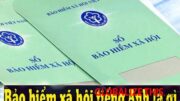[ad_1]

Take action on UpLink



The Forum’s COVID Action Platform: Over 1,500 organizations are working together in response to the pandemic
A “vaccine passport” or “e-vaccination certification of compliance for border crossing regulations” could be required to enable seamless border-crossing. Any framework that comes into place will need to be harmonized by a normative body – such as the WHO – to ensure that its use is ethical and fair. The European Union and other countries like Israel have already developed official standards.
The global vaccine rollout is underway with millions of vaccines purchased and administered. The vast majority of COVID-19 vaccines have so far gone to wealthy nations, however, with low income countries receiving only 0.2% of all shots given. As the world”s largest vaccine producer, India”s current crisis has sparked fresh fears for vaccine production.
Bạn đang xem: International passport là gì
But despite these challenges, there is growing hope that in time the world’s populations could become COVID-19 immune and there are promising signs that the vaccines are highly effective. Results from a study in Israel revealed this week that two doses of the Pfizer/BioNTech vaccine offers 95% efficacy against infection, hospitalization and death from COVID-19.
The expectation is that with a vaccine, some aspects of life will return to normal – especially when it comes to travel – which has been particularly hard-hit. This is where a “vaccine passport” or “e-vaccination certification of compliance for border crossing regulations” might become a required travel document, to enable seamless border-crossing and the harmonization of varying national laws.
A recent survey showed strong support for vaccine passports, with more than three-quarters of people worldwide thinking they should be mandatory for travel.
The European Commission has announced it intends to open up to foreign tourists this summer, and plans for a digital certificate for travel, which would cover anyone vaccinated against COVID-19 or those who have had a negative test or have recently recovered. Its proposed Digital Green Certificate will facilitate safe free movement inside the EU during the pandemic.
There are important questions to be asked, however, around whether vaccinations rule out the potential for transmission, the difference between evidence of inoculation and evidence of immunity, and the rights of those people who may be unable to have the vaccine for health or other reasons.
With this in mind, the World Health Organization (WHO) has been looking into the use of technology in the COVID-19 response, and how it can work with member states toward an e-vaccination certificate. At the present time, it is WHO’s position that “national authorities and conveyance operators should not introduce requirements of proof of COVID-19 vaccination for international travel as a condition for departure or entry, given that there are still critical unknowns regarding the efficacy of vaccination in reducing transmission”.
Importantly, the framework will need to be harmonized, when it comes to standards and the use cases for the certificate, by a normative body like the WHO to ensure that it upholds ethical and equitable principles.
There are also separate initiatives among the private sector, such as the Vaccine Credentials Initiative, which are feeding into this work by offering authentication tools.
Xem thêm: Hướng Dẫn Cách Chơi Wefinex, Hướng Dẫn Chi Tiết Sàn Wefinex Cho Người Mới
Here, Arnaud Bernaert, Head of Shaping the Future of Health and Healthcare at the World Economic Forum, explains why the WHO’s framework must be the global standard and what are the use cases for sharing data around diagnostics and vaccines.
The concept of a passport to allow for cross border travel is something that we’ve been working on with the Common Trust Network for many months. The focus has been first on diagnostics. That’s where we worked with an organization called “The Commons Project” to develop the “Common Trust Framework”. This is a set of registries of trusted data sources, a registry of labs accredited to run tests and a registry of up-to-date border crossing regulations.
The set of registries can be used to generate certificates of compliance to prevailing border-crossing regulations as defined by governments. There are different tools to generate the certificates, and the diversity of their authentication solutions and the way they protect data privacy is quite remarkable.
We at the Forum have no preference when it comes to who is running the certification algorithm, we simply want to promote a unique set of registries to avoid unnecessary replication efforts. This is where we support the Common Trust Framework.
For instance, the Common Pass is one authentication solution – but there are others, for example developed by Abbott, AOK, SICPA (Certus), IBM and others.
The Common Trust Network, supported by the Forum, is combining the set of registries that are going to enrol all participating labs. Separately from that, it provides an up-to-date database of all prevailing border entry rules (which fluctuate and differ from country to country).
Combining these two datasets provides a QR code that border entry authorities can trust. It doesn’t reveal any personal health data – it tells you about compliance of results versus border entry requirements for a particular country. So, if your border control rules say that you need to take a test of a certain nature within 72 hours prior to arrival, the tool will confirm whether the traveller has taken that corresponding test in a trusted laboratory, and the test was indeed performed less than three days prior to landing.
The purpose is to create a common good that many authentication providers can use and to provide anyone, in a very agnostic fashion, with access to those registries.
There is currently an effort at the WHO to create standards that would process data on the types of vaccinations, how these are channelled into health and healthcare systems registries, the use cases – beyond the management of vaccination campaigns – include border control but also possibly in the future access to stadia or large events. By establishing, in a truly ethical fashion, harmonized standards, we can avoid a scenario whereby you create two classes of citizens – those who have been vaccinated and those who have not.
So rather than building a set of rules that would be left to the interpretation of member states or private-sector operators like cruises, airlines or conveners of gatherings, we support the WHO’s effort to create a standard for member states for requesting vaccinations and how it would permit the various kinds of use cases.
It is important that we rely on the normative body (the WHO) to create the vaccine credential requirements. The Forum is involved in the WHO taskforce to reflect on those standards and think about how they would be used.
When registry frameworks are being developed for authentication tools providers, they should at a minimum feed as experiments into the standardization efforts being driven by the WHO, knowing that the final guidance from the only normative body with an official UN mandate may in turn force those providers to revise their own frameworks. We certainly support this type of interaction, as public- and private-sector collaboration is key to overcoming the global challenge posed by COVID-19.
As the WHO has warned, vaccine nationalism – or a hoarding and “me-first” approach to vaccine deployment – risks leaving “the world’s poorest and most vulnerable at risk.”
COVAX, supported by the World Economic Forum, is coordinated by the World Health Organization in partnership with GAVI, the Vaccine Alliance; CEPI, the Centre for Epidemics Preparedness Innovations and others. So far, 190 economies have signed up.
The Access to COVID-19 Tools Accelerator (ACT-Accelerator) is another partnership, with universal access and equity at its core, that has been successfully promoting global collaboration to accelerate the development, production and equitable access to COVID-19 tests, treatments and vaccines. The World Economic Forum is a member of the ACT-Accelerator’s Facilitation Council (governing body).
What does waiving intellectual property rights for COVID-19 vaccines mean?
The United States has lent its support to a plan to waive intellectual property rights for COVID-19 vaccines, boosting a proposal led by India and South Africa.
What is a ‘vaccine passport’ and will you need one the next time you travel?
A “vaccine passport” or “e-vaccination certification of compliance for border crossing regulations” could be required to enable seamless border-crossing.
[ad_2]





